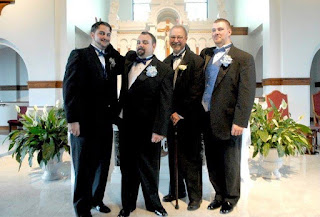 |
| David Edward Deinlein 1951-2019 |
He was talking about my job as a reporter in Hanover, Pa. He noted that while he wished I'd gone into a line of work that might have provided a more comfortable salary, he said he realized that what I was doing meant something as he began to see my byline atop stories on the paper's website, or when I'd bring down editions on visits home to Kingsville, Md.
Though his views on my profession weren't always positive, he knew that I liked what I was doing and was glad that I felt I was making a difference in this world.
And so, it's fitting perhaps that the last time I spoke to him was Oct. 2, 2019, from the old pressroom of my newspaper, of which I had become the managing editor not long before. It's the old pressroom because the printing press was dismantled and sold a decade earlier. The space is now an event venue, with hints at the deadlines and spilled ink covered with faux wood flooring and flat gray paint.
It was just after noon when I called him in his hospital room. He was there for treatment after his second heart attack in 18 months. Though his voice was weak, he seemed in good spirits. He joked about the nurses not letting him have potato chips.
I told him about work — an industry under pressure from all sides. I bragged about my daughters, how smart they were for their ages and how talented they were in art. I could hear a smile in his voice.
On that Wednesday afternoon, I told him that I'd be down to see him on Friday. I'd already spoken with Mom earlier and made the plan. With work and other obligations, it would be easier that day.
As we were hanging up, my finger poised above the red button of my iPhone, I thought I should say, "Hey, Dad, I love you." But it was too late. My thumb was already on the screen, and I'm pretty sure Dad had put his receiver down, too. He died two hours later.
 |
| Dad circa 2010, feeling no pain at a family wedding. |
But he said that he tried to show his love and pride by providing me opportunities. I went to Catholic grade school, high school and college. I was taken to historic sites in and around my hometown of Baltimore. We had a computer and printer, and I had a car when I was 16, albeit one that had seen happier times. I was able to attend summer enrichment programs at local colleges while in grade school, and went to a young journalist confab in D.C. when I was in high school. All the while, he often worked 12-hour days or longer in an industry also known for being under pressure.
Now, looking back at that last moment I spoke to him, wishing I'd been able to say, "I love you," I hope he knew.
 |
| My brothers, my father and I on my wedding day. |
I hope he knew I was proud of him and that I appreciated him working himself to death for me, my brothers and our mother. I hope he knew that his love for me was embodied in my being able to do something I enjoyed and that I thought made a difference in this world.
Even though I'm a writer by trade, I couldn't bring myself to put into words the thoughts that have been swirling since October.
So on this, my first Father's Day without him, I want it known that I loved him, was proud of him, and hope I can be half the father he was.
May the souls of the faithful departed, through the mercy of God, rest in peace.
Amen.